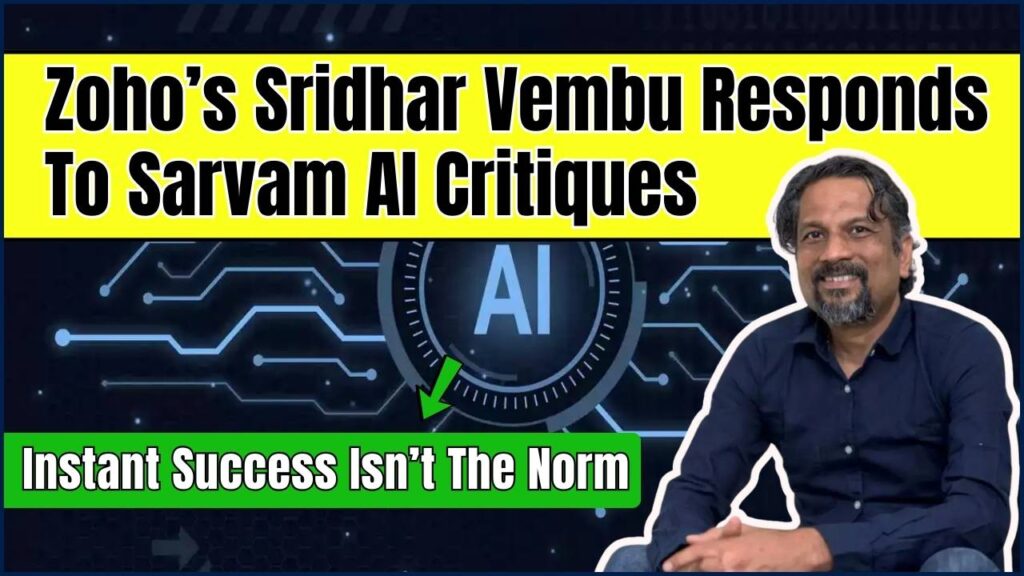
Sridhar Vembu Responds To Sarvam AI Critiques: When Sarvam AI unveiled its Sarvam-M language model, a 24-billion-parameter powerhouse fine-tuned for Indic languages, math, and programming, it immediately grabbed headlines. But the model’s initial download figures — just 334 in the first two days — triggered skepticism and critique from some quarters. That’s when Zoho founder Sridhar Vembu stepped up, dropping some seasoned advice that resonates far beyond Sarvam AI’s launch.
Vembu reminded the tech world, especially startups and innovators, that instant success is a unicorn, not the standard. His perspective rings especially true in the complex, evolving world of artificial intelligence — where patience, persistence, and purpose drive long-term wins.
In this article, we unpack the full story behind Sarvam AI’s launch, the critique it faced, Vembu’s insightful response, and what it means for innovators and the broader AI ecosystem. We’ll also explore Sarvam-M’s real-world potential, the Indian AI landscape, and practical lessons on navigating early criticism.
Sridhar Vembu Responds To Sarvam AI Critiques
| Key Point | Details |
|---|---|
| Sarvam-M Model Launch | 24-billion parameter hybrid LLM focused on Indic languages, math, and programming |
| Initial Downloads | 334 downloads within first two days |
| Vembu’s Response | “No product we have built was ever an instant hit.” Encouraged persistence and long-term vision |
| Indian AI Ecosystem | Sarvam AI is part of IndiaAI Mission’s push for sovereign AI development |
| Potential Applications | Support for multiple Indic languages, math reasoning, programming tasks |
| Challenges for AI Startups | Early user adoption, awareness, infrastructure limitations |
Zoho’s Sridhar Vembu’s candid response to the critiques of Sarvam AI’s Sarvam-M model is a masterclass in startup wisdom. It’s a reminder that building transformative technology, especially in AI, demands time, resilience, and a big-picture mindset.
Sarvam AI’s dedication to India’s linguistic diversity and sovereign AI ambitions is a beacon for how innovation can be both locally relevant and globally significant. As the AI space evolves, the real winners will be those who stick it out, listen to feedback, and keep refining.
For entrepreneurs, developers, and tech enthusiasts, Vembu’s message is clear: don’t chase overnight glory; build something meaningful that lasts.
Who Is Sridhar Vembu? Why His Opinion Matters
Sridhar Vembu isn’t just any tech leader. He’s the brain behind Zoho Corporation, a trailblazing software company that quietly disrupted the global SaaS market. Starting in a modest setting, Vembu built Zoho into a multi-billion dollar enterprise known for its innovation and customer-first philosophy.
His journey is a textbook example of how patience, customer trust, and relentless innovation beat flash-in-the-pan success. So when Vembu says “no product we built was ever an instant hit,” it’s coming from decades of hands-on experience steering a company through highs and lows.
Global Trends: Slow Starts Are the Norm for AI Models
Sarvam AI’s early download numbers might seem low at first glance — but the tech world has seen this playbook before. Many successful AI projects and startups, from OpenAI’s GPT to Google’s AI tools, took time to build user trust and ecosystem support.
Launching an AI model is only the start. Real traction depends on developer adoption, integration in apps, and iterative improvements based on feedback. Early adoption numbers rarely capture the full picture.
Sarvam AI and the IndiaAI Mission: Driving Sovereign AI
Sarvam AI operates within the ambit of the IndiaAI Mission, a government-backed initiative aimed at making India a global leader in AI innovation. The focus on “sovereign AI” means building AI models that respect local languages, data privacy, and societal needs.
Sarvam-M’s ability to process 14 Indic languages, coupled with math and programming skills, is a bold step toward digital inclusivity and tech independence.
Potential Real-World Applications of Sarvam-M
Sarvam-M isn’t just a research toy — it has clear applications:
- Education: Personalized tutoring in native languages, math problem-solving help.
- Healthcare: Support for patient queries in local languages.
- Government Services: Multilingual chatbots to make civic services more accessible.
- Tech Development: Assisting programmers with code generation in regional contexts.
These applications can revolutionize how millions engage with digital tech daily.
Common Challenges for AI Startups Like Sarvam AI
Building and launching AI models is complex. Startups face hurdles including:
- Awareness: Getting developers and users to know about and trust the model.
- Infrastructure: Deploying large models requires powerful compute resources and stable connectivity.
- Language Diversity: Ensuring quality across many dialects is technically demanding.
- Market Education: Explaining AI benefits to non-technical stakeholders.
Sarvam AI, like many pioneers, is navigating these challenges.
Vembu’s Message to Innovators: Persistence Beats Panic
On his X account, Vembu’s words are a rallying call for startups everywhere:
“There is no product we have built that was ever an instant hit. It took time, patience, and iteration.”
He urges innovators not to be demoralized by initial criticism or slow uptake. Instead, focus on continuous improvement, user engagement, and long-term vision.
Expert Perspectives: What Industry Leaders Say
Dr. Anjali Singh, AI Researcher at IIT Bombay, shared:
“Sridhar Vembu’s message resonates deeply. AI is an evolving space where user trust and product maturity build gradually. Early skepticism is normal, even healthy.”
Similarly, Rajesh Kumar, CTO of an AI startup, noted:
“India’s unique linguistic diversity demands specialized AI solutions. Sarvam AI’s work is pioneering, and its impact will grow with time.”
What’s Next for Sarvam AI and Zoho?
Sarvam AI plans to keep refining Sarvam-M, engaging with the developer community, and partnering with institutions to expand its reach.
Zoho, under Vembu’s leadership, continues to innovate, providing a strong example of how persistence and focus on core values create lasting impact.
How You Can Get Involved
Interested readers can:
- Explore Sarvam-M on Hugging Face
- Follow Sarvam AI’s updates at sarvam.ai
- Join AI forums to contribute feedback and ideas
- Support initiatives promoting regional language AI solutions
FAQs About Sridhar Vembu Responds To Sarvam AI Critiques
Q1: Why are initial downloads of Sarvam-M low?
Early adoption is often slow for specialized AI models due to awareness, infrastructure needs, and user trust building.
Q2: How does Sarvam AI fit in India’s AI strategy?
Sarvam AI aligns with IndiaAI Mission’s goals to build sovereign AI tailored to local languages and needs.
Q3: Can Sarvam-M understand multiple Indian languages?
Yes, it supports 14 Indic languages, enhancing accessibility for diverse users.
Q4: What industries can benefit from Sarvam-M?
Education, healthcare, government services, and software development are key sectors.
Q5: What can startups learn from Sridhar Vembu’s advice?
Stay patient, embrace iteration, engage users, and focus on long-term success rather than instant hits.











